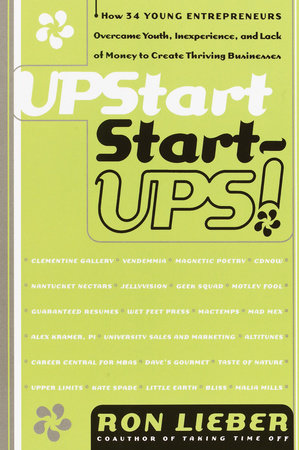You Want to Be Where Everybody Knows Your NameMost traditional marketing is really expensive. Fortunately, however, you can do a lot of other things to spread the word about your business, and most of them cost a lot less than advertisements. First of all, you'll need a name. It's worth spending a lot of time thinking about this, because a good one can really set your business apart. Think about how often you'll be dropping your company's name into conversation once you actually pick it. One hundred times a day? One thousand? What about the number of times customers or potential customers will come into contact with it? Thousands? Tens of thousands? It better make a damn good impression. (Also, once it does, you can be sure someone will try to steal it if you don't have it trademarked, so make sure to talk to a lawyer about this.)
An outrageous impression helps too. This was the tack that David and Tom Gardner took when they named their online personal finance site the Motley Fool. "We knew what we wanted to do," David recalls, noting that most personal finance guides at the time were dry, boring, and lacked any sort of edge or attitude. "We just didn't have a name for it. And then we thought of the fool. It's actually a great position to come from, because there's no pretension whatsoever about it. I had read Shakespeare's plays in high school and college, and the fool was always a great character--funny, smart, unusual, distinctive. If we screwed up, well, we were fools anyway and we tried our best. But if we succeeded, well, then that would be a very interesting position. We could tell people to just make of us what they would--we're fools, and meanwhile all the other people out there trying to tell you how to manage your money are wearing pin-stripe suits and trying to look impressive. But they're not succeeding at helping you beat the market. So what are you left with?"
What they were left with was not so much the distinctive image of two brothers in clown suits and Dr. Seuss hats. Instead, the notion of the fool came across as a sly marketing ploy. What it said was that this company's approach to investing would be radically different, and probably a whole lot of fun too. It made the Gardner brothers out to be people just like their customers, instead of all-knowing gurus. What could it hurt for someone to at least check it out on America Online? And once they did, what would keep them from jumping in the discussion areas and offering up their point of view, whatever expertise they could toss in? Nothing, it turns out. Today, the best thing about the Motley Fool is that so many different people do just that, and now the Fool stands for the little guy slugging it out against the Wall Street big guys trying to create a stock portfolio that will beat those so-called pros.
The subtlety of the Fool works quite well, but it's difficult to pull that sort of thing off. So it's fine if you want to take an easier route and have your business's name create a sharp mental image in the minds of your potential customers. "In the first big space I had, the business was called 'Let's Face It,'" says Marcia Kilgore. "But I decided that was a little too sarcastic, because when you're getting a skin treatment, you're not supposed to be facing anything. You're supposed to be forgetting it all for a while. I didn't want anything French, because that would be too poofy. That's not what we are--we're happening people having a good time here. So I just thought about how you would describe the best feeling you could possibly have--happiness, elation. Then it just came to me: Bliss. It's catchy, and we can have a mail order catalog of beauty supplies called Bliss Out and a press kit that says 'Pu-Bliss-Ity' on it. I was lucky that no one else had thought of it before me."
When Robert Stephens set out to create a computer repair service in Minneapolis that would be worlds apart from anything that had come before it, he knew that even the name would have to be truly different. "The first thing I did was to see what the competition called themselves," he recalls. "The same two names were in front of every business in this town--Northern Lights and Twin Cities. Northern Lights Computer Repair, Twin Cities Molding and Dye, and on and on. Then there were the Technodynes and the Cybersystems. In terms of corporate identity, those prefixes are so overused. They've been totally deadened. The meaning is gone."
While the word
geek isn't exactly underutilized either, no one had ever thought to name their business with the term. "The name of the company needed to do two things," Stephens explained. "It needed to explain that we were a group, even though I was the only member at the time. And it needed to emphasize that we were technical people. So what's a good word for that?
Rocket scientists? Engineers? Nerd was kind of funny, but
geek had a great phonetic ring to it. Then it needed an action word to get at the fact that we were a group of people performing a function. After a while, I came up with this idea of a bomb squad. How many people can say they work for a bomb squad?"
So Robert Stephens became the Geek Squad, and while the name doesn't explain exactly what his business does, it conveys enough of a promise of something really interesting that it ends up working quite well. It's all right to be literal too, as long as you don't end up sounding like all those Northern Lights companies. When Kevin Donlin set out to name his rÚsumÚ consulting business, he looked in the Yellow Pages and laughed at all the companies that had tagged themselves with names like AAA Resumes to be the first enterprise listed alphabetically under "Resumes" in the directory. "There was no niche evident anywhere," he recalls. "No one had made any effort to distinguish themselves other than to be listed first. Now people tell me that they looked at 20 different firms in the phone book and on the Internet, but they called me because my name, 'Guaranteed Resumes,' stuck out. It really is one of my strongest marketing weapons."
If you're not like Donlin and have a product to sell instead of a service, assigning a great name to your most prominent product can give a fledgling business a boost too. "We chose the name 'Dave's Insanity Sauce,'" says Dave Hirschkop, founder of Dave's Gourmet. "The name of the product matches the product, which is the hottest of the hot sauces. You've got to be crazy, just insane, to use it. The label looks that way. The way we conduct ourselves at trade shows backs it up. We even started answering the phone in a way that would make people think we were nuts." In a sea of thousands of hot sauces, that's not a bad way to make yours stand out. And while naming a company after yourself usually reeks of pretension, in the food business it sends a nice message--that there's some guy named Dave somewhere cutting up habaneros so that you can experience the heat yourself.
Copyright © 1998 by Ron Lieber. All rights reserved. No part of this excerpt may be reproduced or reprinted without permission in writing from the publisher.






